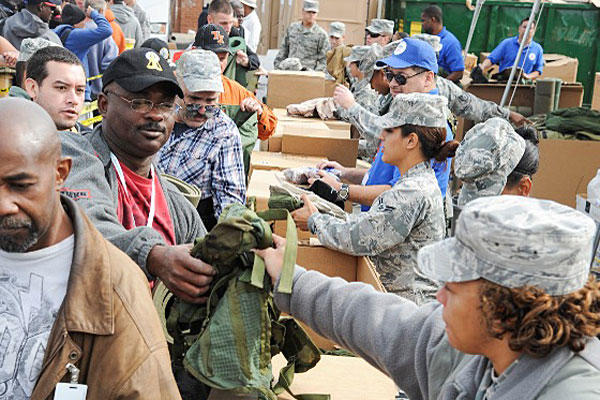As the Department of Veterans Affairs supposedly nears its goal of ending chronic veteran homelessness in 2015, the groups that support homeless veterans are worried about the VA's support in 2016.
VA Secretary Eric Shinseki vowed in 2009 that the department would end chronic veteran homelessness sometime in 2015. The number of vets on the streets has since dropped by 24 percent, according to the VA, and Shinseki has told Congress the department is on track to achieve its goal next year.
After 2015, Shinseki said, there will still be veterans who become homeless, but all the programs will be in place -- from the federal to the local level -- to ensure they do not remain homeless for any lengthy time.
Steve Peck, president of the U.S. Veterans Initiative, has worked to combat veteran homelessness for more than 20 years. He said plenty of work remains before the end of chronic veteran homelessness and doubts it can be accomplished by next year.
VA officials have already told groups like U.S. Veterans Initiative that homeless funding will go down after 2015, Peck said. Those groups are now scrambling to figure out how to replace it, he explained.
"Just because the VA says it's over, doesn't mean it is. We're still seeing plenty of need," Peck said.
He cited the influx of troops who will be leaving the military as the services pare down end strengths to meet budget reduction goals.
"With more troops leaving the military, this is an especially vulnerable time when we've seen homelessness go up," Peck said.
VA officials said the department will begin directing more attention and funds for jobs for its rescued vets. There will be more focus on preventing homelessness versus rescuing veterans from the streets.
"We're already gearing that up now and building that into our homeless programs and into our mental health programs, a strong employment component, because we think that's going to be critical to [veterans'] long-term independence," said Vince Kane, director of the VA's program for eliminating homelessness among veterans.
Kane said it is too soon to say how much the VA expects to budget for these supportive programs, which will include partnerships with the Labor Department and grants to community and business groups. But the VA considers employment a critical part of preventing veteran homelessness from again spiraling upward.
"The goal is to have somebody be as independent as they can be in their housing and in their community," he said.
For 2015, the VA is seeking $1.6 billion for its programs for ending homelessness -- $248 million more than in 2014. The money includes $500 million for Supportive Services for Veteran Families, an increase of 47 percent over the current year, and $374 million for its joint program with the Department of Housing and Urban Development.
Under HUD-VASH -- for Veterans Affairs Supportive Housing -- vets and their families are able to rent private housing through HUD's Section 8 program while the VA provides the vet clinical and supportive services through its health care system.
The VA is also continuing its Grant and Per Diem program. The $253 million program, up 1 percent from 2014, provides funding to community housing and support centers that assist veterans with a range of services.
The various programs have all succeeded in helping bring down veteran homelessness, the VA says, though there have been concerns from communities about what happens if funding goes away after 2015.
"I think what community groups are really anxious about is that the support package for somebody with a severe, debilitating mental illness who was chronically homeless, they're going to need that support to sustain their housing for many, many years to come," Kane said. Programs such as HUD-VASH are designed with the long-term needs of these veterans in mind and will not disappear, he said.
"You don't want anybody thinking that once you put somebody that is chronically homeless in housing, that it's job over. It's not job over," he said. "It takes a tremendous amount of support to keep that person in housing, and those support dollars are well spent because having them in housing is much cheaper than having them in an emergency room or in an acute care hospital somewhere."
Funding would be adjusted over time to provide the veteran with just the support needed, but in cases where the support needs to be long term, it will be, he said.
-- Bryant Jordan can be reached at bryant.jordan@monster.com. Michael Hoffman can be reached at Mike.hoffman@monster.com.



























